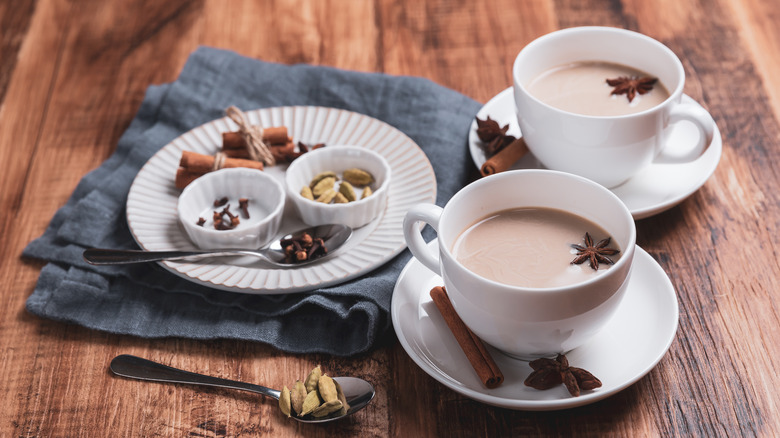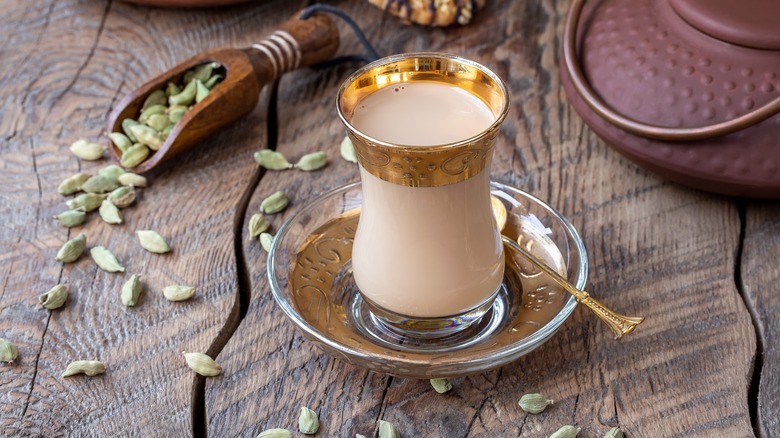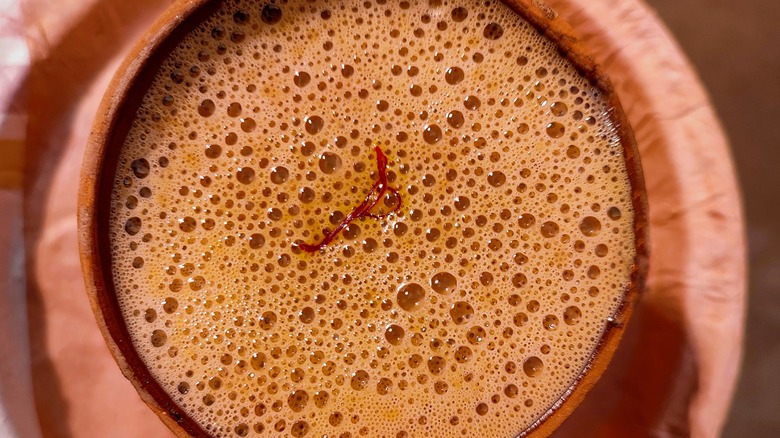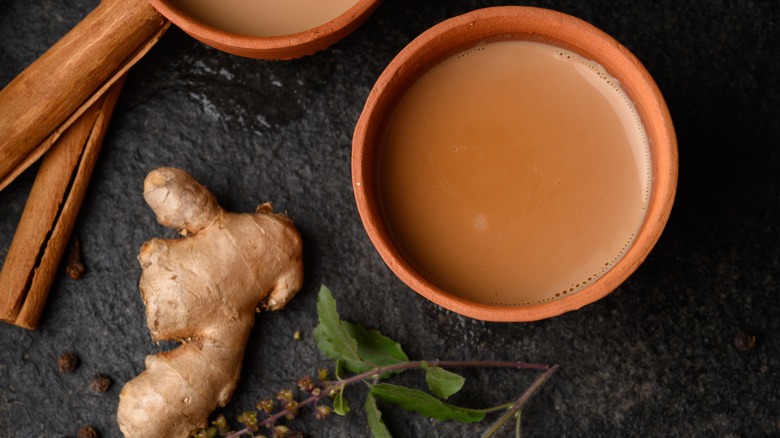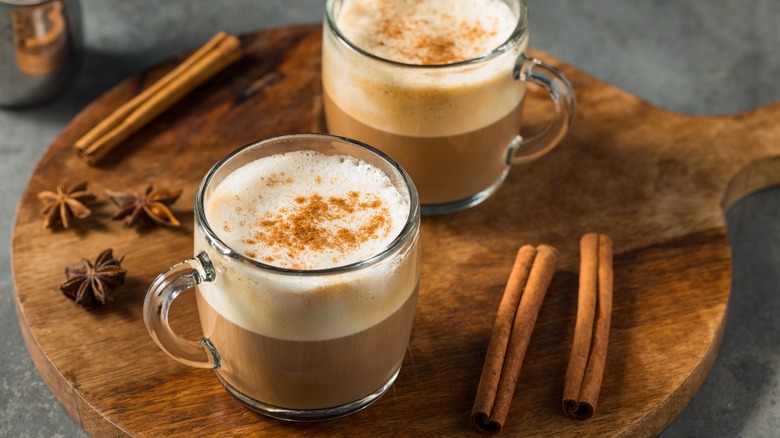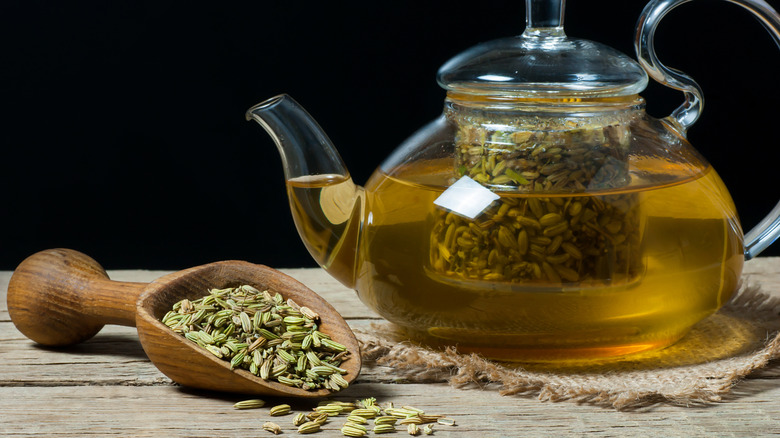The Best Spices To Give Americanized Chai A Major Flavor Upgrade
When you think of a hot chai, you probably imagine a well-spiced and sweetened cup of tea sporting a frothy dose of milk. As the drink hails from India, it's unsurprising that some things have been lost in translation once it was brought stateside. For instance, while we may think of chai tea as meaning spiced tea, chai roughly translates to spiced, sweetened black tea in India. And masala chai is more than just spiced tea — it's a blend of spices. Another thing we've lost in the shuffle? The true flavorful essence of the recipe itself.
The Americanized chai usually features a powerful spice blend of cinnamon, ginger, cardamom, black pepper, cloves, allspice, and star anise. It can be a lot for the tastebuds to take in, especially when mixed with strong, bitter black tea, sweet sugar, and creamy milk. In India, chai is often flavored with one specific spice, depending on personal preference, regionality, and price point. So if you want to bring a particularly traditional taste to your next cup of chai, take a page from its origin country and let individual spices shine bright. In the following list, we're breaking down some of the key spices featured in an Indian cup of chai and what they specifically bring to the table.
Cardamom chai
Green cardamom is one of the signature spices of India and the standout flavor in elaichi (cardamom) chai. Contrary to the strong woodsy flavor of black cardamom, green cardamom has a more nuanced flavor, imparting floral, citrusy, and peppery notes to your tea. If you're a fan of Swedish kanelbullar (the Scandinavian take on cinnamon buns) or the cardamom blush cocktail, chances are good you're already a fan of the cardamom flavor.
For the freshest flavor, try to infuse whole cardamom (seeds from their green cardamom pods) into your hot tea as it steeps. The more pods you use, the stronger the taste. Ground cardamom will also work, so start by stirring a pinch into a cup, adding more if needed. Some tea brewers will add a bit of black pepper or ginger to their chai to bring a complementary heat, but cardamom alone will work just as well. Cardamom is one of the more expensive spices on this list, making it a bit more pricey than some of the other spices around. For a more affordable option, look to the clove and cinnamon chai or ginger chai.
Saffron chai
As the most expensive spice in the world, saffron chai (also known as kesar chai) can be considered a luxurious drink. The good news is that when it comes to saffron, a little goes a long way. With just a few scarlet threads, you should be able to infuse your tea with a lightly perfumed floral note. Too much saffron can tip the scales into bitter territory, which you want to avoid with the presence of already bitter black tea leaves.
Like with other spices, the best way to infuse the flavor of the saffron is to add it to the hot water before steeping the tea itself. Another method is to infuse the hot, aerated dairy with the saffron instead. Whatever you choose, a few strands are all that's necessary to jump-start the infusion. If you want to add a complementary spice, try the similarly floral cardamom or ginger and black pepper for a spicy counterpoint.
Ginger chai
For those who like it spicy, this tea is for you. Ginger is likely to clear out any sinus cobwebs you may have lingering in the morning. Adrak (ginger) chai is often made with fresh ginger root, not ground ginger powder. Freshly grated ginger has a completely different flavor than the ground version, mellowing out when subjected to heat in a way that the ground ginger doesn't. For the most delicious flavor, we suggest you stick to using fresh ginger root.
For this spicy infusion, try grating one to two teaspoons of fresh, peeled ginger into your boiling tea water, straining it out with the tea leaves when pouring it into your cup. You can pair this ginger-forward chai with any spice you choose, like cardamom or cinnamon, but try to lean toward the sweeter side of the spectrum, as the numbing qualities of clove and black pepper can blow out its nuanced flavor.
Cinnamon and clove chai
This rendition is probably the closest to our American-style chai in that it celebrates a blend of spices. Often paired together rather than standing alone, warm cinnamon and spicy clove play very well together, hitting two distinct notes that harmonize rather than fight. This is technically the masala chai, and while other spices will occasionally pop up, like star anise and cardamom, the emphasis still lies on the cinnamon and clove.
The cinnamon that a traditional chai would use would be the sophisticated, slightly sweet, and floral Ceylon cinnamon, grown in nearby Sri Lanka. In the States, it's much more common to find the cheaper Cassia cinnamon, which is noticeably spicier and less delicate in flavor. You can still use it to get a similar taste; it just may be less perfumed. Whole cloves will be easier to locate and will lend your tea a nice punch of aromatic spice.
While ¼ teaspoon of both ground cinnamon and cloves would work in your chai, use a whole cinnamon stick and cloves for a stronger flavor. You can add in some star anise or cardamom, but see how well the two spices work on their own. You may realize you need little else for an out-of-this-world cuppa.
Fennel chai
Though you may think of fennel as being more appropriate for savory uses (i.e. flavoring Italian sausage or a marinated lamb roast), it also does wonders for your cup of tea. Saunf (fennel) chai champions the sweet, borderline-licorice taste that fennel seeds pack. It also has a slight citrusy note that is an especially nice complement to strong tea.
Like our other chai recipes, whole fennel seeds can be steeped in the tea as it boils, or finely ground and mixed into the drink directly. If you'd like to pair it with another spice, star anise is a good selection, as it runs in the same citrus and licorice-flavored circles. Cardamom and cinnamon are great if you'd like to make a sweet addition. Meanwhile, you can always use ginger or black peppercorns to bring a pop of spice. As a standalone spice, the fennel tea will pack an earthy, sweet punch worth savoring.

